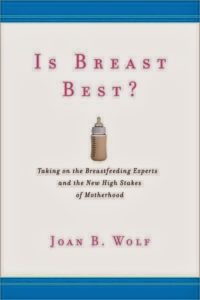
Despite what her name may imply, Joan Wolf is not a children’s literary character. Disappointedly, she is an academic of Gender Studies at Texas A&M University. Her past works include ‘Harnessing the Holocaust: The Politics of Memory in France’ and ‘Conscience at War: The Israeli Soldier as Moral Critic’, which makes her perfectly suited to critiquing breastfeeding, no?
At least her identity as wannabe historian is transparent. A lot of the ‘evidence’ in this monographic rant is courtesy circa 1930. Come on, even the title of this book is lazy and out of date. No one is asking that question anymore Wolf, get with the program! Is Breast Best? No! Breast is normal. Alternatives to the breast are deviations from the norm. Look at it this way, ‘Breast is Best’ is like saying drinking a glass of water through your mouth is best, over funnelling it into your belly button. A normal physiological act cannot be ‘best’ – it’s just freekin’ normal. Jeeez.
I flick the face of anyone that claims this book is unbiased. Its fatal flaw lies in the unfortunate fact that its entire foundation is built upon two faulty assumptions: 1. That there exists a “Total Motherhood” zeitgeist; and 2. That Western culture is pedantically risk-adverse. I’ll roll up my sleeves and tackle each in turn:
1. The Total Motherhood Strawman
Wolf builds a house of straw only so that she can huff and puff and blow it all down, (sorry I couldn’t resist).

She begins her lament by asserting that:
“The significance of breastfeeding in America has its roots in long-held assumptions about femininity and masculinity”
Emm, what assumptions would that be? That women lactate and men generally don’t? That’s not an assumption, that’s fact. Quick! Someone call the sexism police! God’s being unethical!
Alas, we can’t blame Wolf for crying feminism. The trouble with a woman’s studies academic writing a book about breastfeeding is that her frame of reference is not necessarily a good match for the subject matter. Wolf paints the whole topic with a sociological brush, when by its very nature, breastfeeding is, of course, physiological. The fact that women lactate is not a patriarchal conspiracy. Yet Wolf describes the advent of (man-made) formula as a feminist triumph, welcoming it with open arms and wet panties, and describing it as:
“Evidence of our conquest of nature and mastery over our body”.

Formula is central to women’s liberation because apparently, our mammary glands are not just organs which produce milk to feed offspring, they are tools of the Patriarchy, designed to warp our minds and turn us into neurotic perfectionists. Breastfeeding is allegedly at the core of what Wolf calls “Intensive Mothering”, “The New Momism” and “Total Motherhood”. These rhetorical devices are designed to emphasise the pressure placed on mothers (but not fathers! The conspiracy!) to be “experts at everything”. This makes sense in a book about breastfeeding – dads have been dealt a duff card by Mother Nature on that front – however, Wolf asserts that Total Motherhood applies to all aspects of parenting: care, education, health, safety, behaviour, et al. Not only is this hyperbolic fiction, it is deeply offensive and dismissive of fatherhood. It smacks of the “don’t breastfeed because dad won’t be able to bond” fable, or more precisely, “don’t breastfeed because it lets lazy-ass dad off the hook”. Dads might not be able to lactate, but they can do pretty much 99% of the other stuff. Parenthood is a joint venture and the bulk of current evidence reveals that men are stepping up. In reality, the closest we ever came to Total Motherhood was in the 1920s when childrearing was regarded as the unique domain of women. Nowadays, Total Motherhood has long been replaced with Total Parenthood. Wolf is 90 years too late in her theory, which is kinda embarrassing for a sociology professor and wannabe historian.
Next, we can see deeper evidence of Wolf’s flawed reasoning when we look at the core of her Total Motherhood facade. This, we are told, is an anal preoccupation with risk:
2. Our Supposed ‘Risk-Adverse’ Culture
For her second strawman, Wolf bases her analysis on American society and speaks of a “risk culture” which:
“drives many people to build their life around reducing all conceivable risks. What they eat, how they raise their children, and which cars they drive”.
Apparently:
“Efforts to control the future, and specifically to prevent negative events from taking place, serve as an organizing principle”.

However, OCD-sufferers aside, the bulk of us don’tact this way. In fact, America and their Western cousin Britain are considerably accepting of risk. Renowned social psychologist Geert Hofstede (I’ve written about this dude previously) studied this phenomenon for several decades and found that the USA and UK were “uncertainty accepting”, “comfortable in ambiguous situations” and willing to take risk. Turns out, our countries have “a larger degree of acceptance for new ideas, innovative products and a willingness to try something new or different, whether it pertains to technology, business practices, or foodstuffs” (Hofstede 2014). This is the polar opposite of what Wolf is basing her entire book upon.
She further stuffs her strawman by denouncing breastfeeding studies, drawing a phony distinction between “what children need (formula) and what might enhance their physical, intellectual, and emotional development (breastfeeding). Yet breastfeeding doesn’t ‘enhance’ anything. It’s merely the biological benchmark for normal physiological functioning. Again, the way this debate is framed by Wolf is remarkably off-course. It views breastfeeding as an optional extra – and one which is not worth the effort.
In a nutshell, this book is Wolf’s attempt to use her idiosyncratic faux concepts to frame women’s infant feeding choices, the very thing she disparages others for doing. At a pinch, I award it one star for effort.










